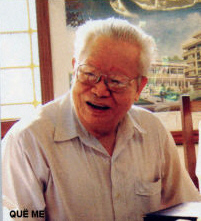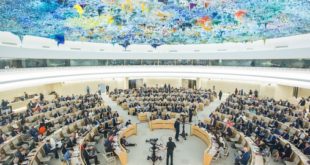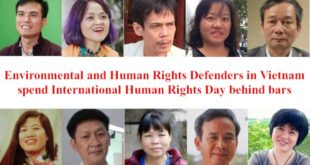The Vietnam Committee on Human Rights has obtained a copy of a letter sent by a high-ranking military veteran to the Vietnamese Communist Party (VCP) leadership which sheds new light on the inner workings of the VCP’s military intelligence services, and exposes deep schisms within the leadership of the VCP. The revelations in this letter are particularly significant since it’s author, retired Major-General Nguyen Nam Khanh, former member of the VCP’s Central Committee and the Central Military Party Committee, has held many key posts within the VCP and the People’s Army. A native of Quang Ngai, Nguyen Nam Khanh was formerly Deputy Head of the VCP’s Propaganda and Training Department, Political Commander of Military Region Five, Deputy head and Secretary-general of the General Political Department of the People’s Army.
 Major-General Khanh addressed his letter (dated 17 June 2004) to VCP Secretary-general Nong Duc Manh, the Politburo and the VCP Central Control Committee, urging that these “extremely serious issues” be raised at the 10th Plenum of the VCP’s Central Committee in Hanoi in July 2004. Grave power abuse within the military intelligence is well known to the Politburo, he said, but ”the crimes have never been elucidated and certain top Party leaders have never been sanctioned… This situation is causing great concern amongst Party members regarding the transparency of our Party”.
Major-General Khanh addressed his letter (dated 17 June 2004) to VCP Secretary-general Nong Duc Manh, the Politburo and the VCP Central Control Committee, urging that these “extremely serious issues” be raised at the 10th Plenum of the VCP’s Central Committee in Hanoi in July 2004. Grave power abuse within the military intelligence is well known to the Politburo, he said, but ”the crimes have never been elucidated and certain top Party leaders have never been sanctioned… This situation is causing great concern amongst Party members regarding the transparency of our Party”.
Hanoi’s Security Police received strict orders to prevent Nguyen Nam Khanh’s letter from being leaked to the general public or overseas. On 10 July, Security Police raided the home of Le Hong Ha at 62 Ngo Quyen Street, Hanoi for over four hours, but found nothing. Le Hong Ha, 78, who was former head of the VCP’s all-powerful security apparatus and has been a Party member for over 60 years, became a vocal critic of the VCP in the late 1980s and has been subjected to Police surveillance ever since. Another Hanoi veteran, Tran Dai Son, Party member for 54 years, denounced the Police raid on Le Hong Ha’s home in a letter to the leadership on 20 July 2004. Despite these stringent Police controls, the letter was nevertheless smuggled out of the country.
The 13-page letter denounces the unbridled powers of the “General Department No. 2” (GD2), the VCP’s military intelligence department which include “slandering, intimidation, torture, political assassination” – and the devastating effects of its activities on the VCP leadership. According to Major- General Khanh, the GD2 uses its powers to support or overthrow different factions within the Communist Party, and circulates “News Bulletins” which insinuate links between the CIA and top party officials such as Vo Nguyen Giap, Mai Chi Tho, Vo Van Kiet, Phan Van Khai, Le Kha Phieu etc.. and accuse others of corruption and connivance with the mafia (e.g. Nong Duc Manh).
The GD2 “wields excessive powers and unlimited controls, it sabotages democracy, undermines internal unity, and creates deep divisions and factions within the Party. GD2 can slander or sanction anyone they want, infiltrate their agents anywhere, mount countless business ventures, pretext so-called “intelligence” operations to go on spending sprees, set up bogus “special intelligence units” as a pretext to obtain funds”. For example, he said, at least $US 81,000 were paid out to a “special agent” named T4, allegedly infiltrated into the CIA, who was later discovered to be a total fabrication of GD2.
How is it possible that a military intelligence agency, a subsidiary body in the Ministry of Defence, has such powers to act with total impunity ? According to Nguyen Nam Khanh, it is because the GD2 is “covered” by state legislation which empowers it to conduct subversive actions in complete legality.
He explains that GD2 (initially known simply as “Department No. 2), has exercised vast de facto powers for at least two decades, but in 1996-1997, the Communist authorities “legalized” its powers by adopting an Ordinance on Intelligence Services, signed by Nong Duc Manh, then President of the National Assembly on 14.12.1996, and Decree 96/CP on Defence Intelligence signed by Prime Minister Vo Van Kiet on 11.9.1997. These new laws made GD2 so powerful that Premier Vo Van Kiet later told Nguyen Nam Khanh : “I thought it over for 6 months before finally accepting to sign the decree”.
This “codification of repression” is common practice in Vietnam. The letter affirms that these laws were devised by the military intelligence services themselves, not by the State’s legislative organs. “In our country, everyone knows that laws are not drafted by the National Assembly, and the Prime Minister’s Decrees are not drafted by the PM’s office. No, they are drafted by the “concerned bodies” themselves, to provide a legal protection for their activities”.
These two laws place the GD2 “under the exclusive and direct control of the Vietnamese Communist Party in every domain, responsible directly to the President” (Article 2, Chapter 1 of the Ordinance on Intelligence) ; it is empowered to “be active in the fields of politics, defence, security, foreign relations, economics, science and technology, industry and the environment, society and culture” (Article 1, Chapter 1, Decree 96/CP). “The object and goal of the Defence Ministry’s intelligence forces is to collect news and documents related to the Socialist Republic of Vietnam. It must pay special attention to all countries, organizations and individuals, at home and abroad, who plot or engage in activities aimed to threaten or oppose the Communist Party or the Social Republic of Vietnam” (Article 11, Chapter 2, Decree 96/CP). Thus, the GD2 is not accountable to the government or the National Assembly, but exclusively to the President and the Communist Party leadership.
In his letter, Nguyen Nam Khanh gives many concrete examples of the GD2’s power abuse over the past 20 years, notably the 1983 “Seam Reap Affair” in Cambodia. Following the Vietnamese invasion of Cambodia in 1978, the GD2 (then known as Department No. 2), used incredible violence against high-ranking Cambodian communists in order to maintain Vietnamese domination (1) : “they made fake documents, fabricated evidence, falsely accused innocent comrades (i.e. Cambodian Communist cadres), then used intimidation and torture to extract confessions of crimes they had never committed. These [Cambodian communist cadres] were subjected to such atrocious psychological and physical sufferings that many subsequently committed suicide”. General Le Duc Anh, the military commander in Cambodia was linked to this affair ;
– The “Sau Su Affair” in 1991 : Before the VCP 7th Party Congress, there was a power struggle within the VCP, and a faction led by Vo Nguyen Giap was gaining favour over the orthodox line. In order to undermine this, GD2 recorded the fabricated testimonies of an agent named “Sau Su” calumniating Vo Nguyen Giap, Tran Van Tra and other top cadres in his group. These documents were so realistic that “they deceived the Politburo, the VCP Secretary-general and the Central Committee and many other faithful Party members… This grave slander affair led to deep schisms within the Party and the military leadership which still bear a significant damaging influence today”.
– The T4 Affair : T4 was the name of a fictitious secret agent created by GD2, who was supposedly infiltrated into the CIA. This “agent” filed “hundreds of written and oral reports. The aim was to slander Party cadres and government officials by providing so-called “inside information” from the CIA on cadres who were allegedly being manipulated, or said to have links or affiliations with the CIA. Those accused included Vo Nguyen Giap, Vo Van Kiet, Phan Van Khai, Le Kha Phieu, Mai Chi Tho, Truong Tan Sang” and many others.
Nguyen Nam Khanh’s letter cites extracts from the GD2’s “News Bulletins” on various top-level cadres, e.g. :
– “Re Vo Nguyen Giap : After the 8th VCP Congress, the CIA ordered “group Z” (the group led by Giap) to mobilize support for their views and ideas. They were to use “Ho Chi Minh thought” in order to reject Marxism-Leninism, separate the two ideologies and use Ho Chi Minh thought as a basis to launch a movement for “people’s democracy” (News bulletin 49/96TR, 7.7.1996) ;
– “Re Mai Chi Tho (aka Nam Xuan, former Minister of the Interior, brother of Le Duc Tho, note by the VCHR) : “Charles Rey, the US Consulate in Ho Chi Minh City, visited Nam Xuan at his home. This is abnormal. We do not know the contents of this meeting…” (News bulletin 5.10.1999). Also on Mai Chi Tho, during the “Sau Su Affair”, the GD2 reported : “Warning – Mai Chi Tho and his clique are about to stage a coup d’état”.
– “Re Nong Duc Manh : We are informed that Nong Duc Manh is working in connivance with Minh Phung (a firm involved in one of Vietnam’s largest graft scandals, note by the VCHR). Tang Minh Phung had done a lot of favours for comrade Manh, who was very displeased when Minh Phung was arrested” (News bulletin No 351/97/TR, 17.12.1997).
Nguyen Nam Khanh affirms that the GD2’s agents are infiltrated everywhere, and they use all means of communication, including the Internet, to foment divisions within Party ranks and protect their own political protégés. They do not hesitate to entertain relations with the criminal underworld, “providing intelligence service passes to members of the Nam Cam criminal gang, and working closely with them”.
It is uncertain whether these issues were indeed discussed at the VCP Central Committee’s 10th Plenum. Previous efforts to “reform the Party from within” by veterans such as Nguyen Van Khanh, the late Nguyen Van Tran and others have rarely been taken into account, and indeed have often led to expulsion from the Party or arrest, as in the cases of the late Lt.-General Tran Do or military historian Pham Que Duong.
Commenting on this document, VCHR President Vo Van Ai said : “Nguyen Nam Khan’s letter reveals the existence of a veritable State within the State, exposing a situation far worse than we imagined. Those who think there is an on-going “democratic” debate within the VCP should think again after reading this… The Party’s ubiquitous secret services have no qualms about using slander, torture and political assassinations to control the Party and State leadership, and serve the interests of a covert group of individuals…”
For Mr. Ai, “the existence of this powerful secret service has grave implications, not only for VCP leaders but especially for the ordinary men and women of Vietnam, the workers, intellectuals, independent religious leaders, political dissidents and critics from all walks of life… As long as Vietnam is ruled by secret and omnipotent forces like the GD2, there can be no hope of progress towards the rule of law. The millions of dollars provided by the World Bank, UNDP, IMF and the international community to finance Vietnam’s Legal System Development Strategy (LSDS) and other “pro-democracy” programs will be wasted unless the reign of impunity of the VCP and its secret services is brought to an end”.
The full text of the letter of Nguyen Nam Khanh (in Vietnamese)
(1) Many high-level Cambodian Communists had begun to resent being maintained under Vietnamese tutelage. Pen Sovan, Defence Minister and Secretary-general of the Kampuchean People’s Revolutionary Party, who was handpicked by the Vietnamese, had to be summarily dismissed for his defiant attitude towards Hanoi in 1981. He was sent to Vietnam and placed under house arrest for the next 10 years.
 Quê Me Quê Me: Action for democracy in Vietnam & Vietnam Committee on Human Rights
Quê Me Quê Me: Action for democracy in Vietnam & Vietnam Committee on Human Rights




